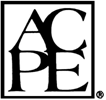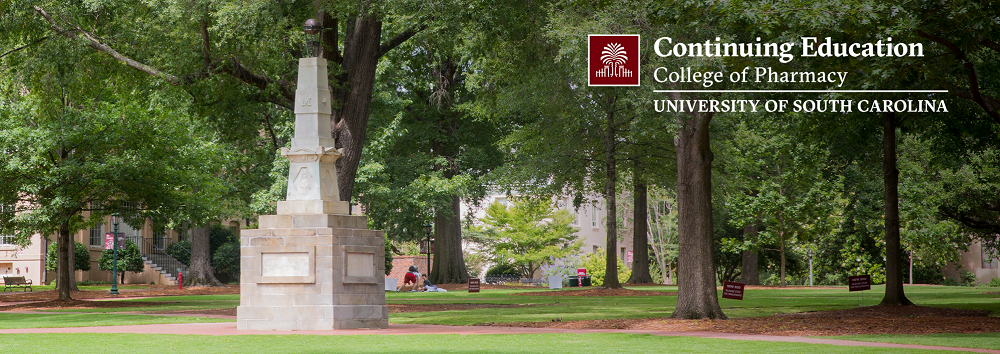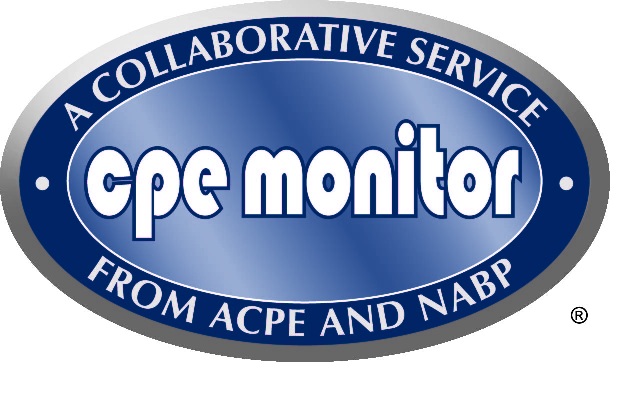
Kennedy Pharmacy Innovation Center, Columbia, SC
GHS Oconee Memorial Hospital, Seneca, SC
- Cancellations received in writing at least 30 days prior to program date via letter or email to CE@cop.sc.edu will receive a full refund minus a $200 cancellation fee.
- USC COP reserves the right to cancel the entire program. In the event of a conference cancellation, each participant will be notified via phone and/or email at least 14 days prior to the program and a full tuition refund will be made.
- In the event of inclement weather, the decision to cancel a course will be made no later than 9:00 am Eastern time the day before the program.
- Individuals attending the course in place of the registered individual will be honored as long as the request is made in advance of the registration deadline, which is 7 days prior to the start of the live component. Transfer participants must still complete the required pre-requisite self-study by the required cut-off date.
- Refund requests are subject to a $200.00 cancellation fee and must be received 30 days prior to the start of the live component. All registration cancellations must be submitted in writing or by e-mail to the Continuing Education Department at the following address: University of South Carolina College of Pharmacy Continuing Education, 715 Sumter Street, Room 314C, Columbia, SC 29208, Email: CE@cop.sc.edu
- Registrants may receive 100% of the program registration fees, less the $200.00 cancellation fee up to 30 days prior to start date of the live component. No refunds are offered for cancellations fewer than 30 days prior to the start date of the live component or for no shows.
- Registration will be accepted until 14 days prior to the start of the live practice based component (Friday, June 1st at 8:00 am) or until capacity has been reached.

- The pre-requisite home study activity must be completed prior to attending the live program. In order to receive continuing education credit for the self-study activities, the participant will be required to complete each reading and video assignment along with review questions and case studies, complete the pre and post-tests and on-line program evaluation. Post-test will be automatically graded, and you must receive a score of 70% or higher to be considered successful. This knowledge based activity has been approved for 7.5 hours of continuing education credit. ACPE#: 0062-0000-17-117-H04-P/T. Initial Release Date: 7/10/2017 Expiration Date: 7/10/2020
- For successful completion for the live practice based activity, participants will be required to attend the accredited program in its entirety, successfully demonstrate practice based competencies using planned simulations, and complete speaker and program evaluations. This practice-based activity has been approved for 16 contact hours (1.6 CEUs) of live continuing education credit. ACPE# 0062-0000-18-018-L07-P/T. Initial Release Date: 03/16/2018 Expiration Date: 03/16/2021
- Credit claimed will be automatically uploaded to CPE Monitor. Each participant is required to provide their NABP ePID and month and day of birth; CPE credit will not be issued to individuals that do not provide this information. ACPE now requires that all completed pharmacy continuing education credits must be processed and claimed no later than 60 days from the date of the live activity or completion of an on-demand activity.
- NOTE: For participants that complete the entire program, Certificates of Completion will be provided.
- Operating System: Windows XP SP2 or later, Windows Vista, Windows 7, Mac OS X 10.5 or later
- Internet Browser (Mac &/ Windows): Internet Explorer 7 or later, Firefox 3.5 or later, Safari 4
- Broadband Internet connection: Cable, High-speed DSL & any other medium that is internet accessible
- Peripherals: Computer speakers or headphones
- Monitor Screen Resolution: 320 x 480 or higher
- Media Viewing Requirements: For some components, the most up-to-date version of Adobe Flash may be required. To obtain the free Flash plug-in, go to http://get.adobe.com/flashplayer/.
|
Time
|
Session
|
Format
|
|
8:00-8:15am
|
Registration, welcome, introductions
|
|
|
8:15-9:15am
|
Introduction to Sterile Compounding
|
Lecture
|
|
9:15–10:15am
|
Overview of USP<797>
|
Lecture
|
|
10:15-10:30am
|
Break
|
|
|
10:30-11:15
|
Hand Hygiene, Personal Protective Equipment, Garbing
|
Lecture
|
|
11:15-1200 pm
|
Dirty Fingertip Sampling, Hand Hygiene, Garbing Demo
|
Interactive Demo
Lab classroom
|
|
12:00-12:45 pm
|
Lunch
|
|
|
12:45-1:45pm
|
Overview of supplies and equipment necessary for sterile compounding
|
Lecture/Demo
|
|
1:45-2:45pm
|
Primary and Secondary Engineering Controls
LAFW; Cleaning/Disinfecting LAFW
|
Lecture/Demo
|
|
2:45-3:00pm
|
Break
|
|
|
3:00 – 5:30pm
|
Exercise 1:
Garbing, hand hygiene competency
Gloved fingertip sample competency
Cleaning/Disinfecting LAFW competency
Demo
Smoke Test Demo
Particle Generation Demo
-------------------------------------------------------------
Exercise 2:
Gather supplies for hands on training and review of relevant calculations for sterile compounded products
|
Lab
Lab classroom & CLS 010
|
|
Time
|
Session
|
Format
|
|
8:00-9:30am
|
Discussion of Aseptic technique and Low/Medium risk sterile compounding
|
Lecture/demo and hands on CLS 010
|
|
9:30– 12:30pm
|
Exercise 1:
Hands on training of Low/Medium risk sterile compounding & aseptic technique
(15 min break as participants finish exercises)
_________________________________________
Exercise 2:
Compatibility/stability, BUDs, Documentation, QA and QC for CSP
|
Lab
Lecture/Demo
|
|
12:30-1:15pm
|
Lunch
|
|
|
1:15-2:30pm
|
Environmental Cleaning/Disinfection Documentation Requirements
|
Lecture
|
|
2:30-5:15pm
|
Review of Fingertip Sample preliminary results and remediation (if needed)
Exercise 1:
Assessment of Student Skills in Low/Medium Risk Sterile Compounding and Aseptic Technique (Media Fill)
Exercise 2:
Demo of Environmental cleaning products, processes, surface and air sampling
(15 min break as participants finish 1st exercise)
|
Lab
Lab classroom
|
- Explain the need for sterile products and the importance of aseptic compounding
- Explain the items a pharmacist should verify for each CSP before it is released from the pharmacy
- Analyze the advantages and disadvantages of different parenteral routes
- Identify USP<797> requirements for the training and evaluation of preparers of CSPs as well as the responsibilities of personnel
- Analyze the difference between primary and secondary engineering controls
- Define ISO classifications 5, 7, and 8
- Describe the layout of a typical clean room, define ante area and buffer area
- Examine supplies used for CSPs and identify factors that influence selection
- Explain necessary manipulations for accommodating positive and negative pressure
- Apply understanding of critical sites and airflow in sterile compounding
- Perform the steps for proper transfers and handling of sterile preparations
- Demonstrate proper techniques to aseptically attach needle to syringe, withdraw contents from vial and ampule, reconstitute vial, and inject into IV bag following all USP <797> guidelines and utilizing appropriate aseptic technique
- Demonstrate proficiency in aseptic technique as it relates to the preparation of different CSPs
- Demonstrate proper garbing procedure, hand hygiene and proper cleaning/disinfecting processes
- Demonstrate accuracy in basic calculations related to the preparation of different CSPs
- Conduct a “media fill test” to assess ability to aseptically compound sterile preparations
- Discuss 3 types of contamination: microbial, chemical and physical
- Differentiate between QA and QC and analyze as it relates to personnel, facilities and monitoring
- Perform verification and final review of a finished sterile product to be dispensed for patient use
- Describe special considerations and requirements with preparation of chemotherapy and hazardous drugs including exposure risks and how to minimize them
- Define parenteral preparations and the role of safety, accuracy and attitude in risk prevention
- Discuss United States Pharmacopeia chapters applicable to pharmaceutical compounding of sterile products
- Define the role of the pharmacist and the responsibilities pertaining to sterile compounding
- Describe supplies and equipment used in sterile compounding and the safety considerations
- Summarize the microbiological considerations in sterile compounding and the responsibilities of personnel in preventing contamination
- Classify sterile preparations as low-, medium- or high risks and determine appropriate BUDs
- Differentiate between primary and secondary engineering controls and the role they play in maintenance of sterile environment for sterile compounding
- Describe the critical steps in proper aseptic technique and compounding manipulations
- Distinguish between quality control and quality assurance for sterile compounding
- Identify the key areas for monitoring for environment, personnel and end-product testing for a sterile compounding program
- Chapter 1: Pages 1-15 and complete review questions on page 14-15
- Chapter 2: Pages 17-62 and complete review questions and case studies on page 62
- Chapter 4: Pages 107-135 and completer review questions and case study on pages 135-137.
- Chapter 5: Pages 141-171 and complete review questions and case study on pages 171-172. View required video for Chapter 5:
- on Page 148: Cleaning the HLFW (Video length 3:58)
- Chapter 6: Pages 175-220 and complete review questions and case studies on pages 220-222. View required videos for Chapter 6:
- Page 177: Hand Washing (Video length 6:09)
- Page 181: Personal Protective Equipment – Garbing (Video length 0:44)
- Page 181: Personal Protective Equipment-Sterile Gloves (Video Length 1:16)
- Page 189: Attach Needle to Syringe and Remove Cap of Needle (Video Length 0:43)
- Page 190: Enter Vial (Video length 1:02)
- Page 192: Withdraw Contents-equal pressure Milking (Video length 0:53)
- Page 192: Withdraw Contents Reverse Milking(Video length 0:36)
- Page 197: Removal of Air Bubbles (Video length 0:54)
- Page 199: Ampule Breaking (Video length 0:59)
- Page 199: Using A filter needle (1:28)
- Page 199: Using a filter straw (1:31)
- Page 206: Reconstituting Medications for Parenteral Administration (Video length 2:15)
- Page 208: Uncapping and Recapping Needles (Video length 0:38)
- Page 209: Capping a Syringe (Video length 0:51)
- Page 210: Priming an Infusion Set (Video length 2:41)
- Page 211: Positive Pressure (Video length 1:12)
- Page 212: Negative Pressure (Video length 0:50)
- Page 218: Workflow Process (Video length 2:12)
- Page 361: Gloved Fingertip Test (Video length 1:06)
Date: Jun 15, 2018 08:00 AM - Jun 16, 2018 05:15 PM
Fee
CE Hours
CE Units
Registration closes on Jun 03, 2018 11:55 PM
Activity Type
- Certificate-Based
Target Audience(s)
- Pharmacists
Accreditation(s)

|
The University of South Carolina College of Pharmacy is accredited by the Accreditation Council for Pharmacy Education as a provider of continuing pharmacy education.
|
Requirements for CE Credit
Registration closes on Jun 03, 2018
at 11:55 PM
Registration Closed
Activity Number
0062-0000-17-117-H04-P
CE Hours
Registration Closed
Speaker(s)/Author(s)
|
Carl E. Dunn, RPh
|
|
|
Herman (Bill) Watson
|
|
|
Nancy Roberts, PharmD, MS
|
|
|
Richard Capps, PharmD
|
|
|
Shay Garrison, RPh, MPH
|

